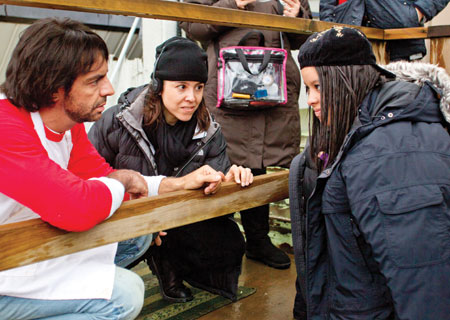By Margy Rochlin
 Riggen considers herself an actor's director, although for indie films there isn't always time to rehearse.
Riggen considers herself an actor's director, although for indie films there isn't always time to rehearse.
(Photo: Brian Davis) You wouldn’t know it by looking at the string of awards that Patricia Riggen’s films have won, but for a long time she thought her niche would be as a producer. “It just didn’t occur to me to try directing,” says Riggen whose most recent film, Girl in Progress, might make her the only Mexican-born woman currently directing movies in Hollywood.
Riggen grew up in Guadalajara, Mexico, and traveled in a circle where everyone ate, thought, and breathed film but the women tended to be the screenwriters or the ones overseeing a project. “When I was in college, my graduation thesis was called ‘Female Directors,’” says Riggen on an early April afternoon as she sits in the airy living room of her house in the Hollywood Hills. “I interviewed all of the important female directors from Mexico. There were four. That was it.”
By the time Riggen was in her early 20s, she’d gone from writing for the local Guadalajara newspaper to working for Mexican producer Bertha Navarro (Pan’s Labyrinth, The Devil’s Backbone) and had traipsed through cemeteries collecting research for a documentary on the death industry to be made by Guillermo del Toro. In the late ’90s, she was production vice president of the short films department at the Mexican Film Institute, the organization that funded early films for Mexican art house star directors such as del Toro, Alfonso Cuarón and Alejandro González Iñárritu. But for all the hours Riggen spent helping some of her country’s finest filmmakers get their creative visions on the big screen, she herself felt professionally flummoxed. “I sat at my desk and thought, ‘I need to go back to school where I can have the space to discover what the hell to do with my life,’” says Riggen.
In fact it wasn’t until she started working on a master’s degree in film at Columbia University that it dawned on Riggen that directing would save her from academic disaster. “I had to write and direct all my exercises and English is not my first language, so I started writing all these little movies that had no dialogue,” says Riggen. Her instincts were sharp enough to know that when the handyman in her Manhattan apartment building mentioned his impoverished family had been the subject of a renowned magazine photographer’s 1968 Life magazine essay, she’d found the seeds of her first semester project. Called Family Portrait, the 28-minute documentary is a tragic look at an African-American family struggling to survive in ’60s-era Harlem, and its relationship with photojournalist (and later director) Gordon Parks.
The problem was Riggen had no idea Gordon Parks was an American photographer of great consequence, and that she had scored a coup by getting him to appear on camera. “Being foreign, I didn’t understand how iconic he [and Life magazine] were,” says Riggen. “I had no idea he was so important.”
So the film sat on the shelf until her last year at Columbia when she won the Student Academy Award gold medal for another assignment, La Milpa (The Cornfield)—a reminiscence about love during the Mexican Revolution. Riggen used the $5,000 cash prize to re-edit and add a score to Family Portrait, which came out so well it was accepted by the Sundance Film Festival where it took home the 2005 Jury Prize in Short Filmmaking.
 PROBLEM SOLVER: Riggen applied what she learned coming up in the Mexican film industry to Girl in Progress. (Photo: 2011 Pantelion Films/Bob Akester)
PROBLEM SOLVER: Riggen applied what she learned coming up in the Mexican film industry to Girl in Progress. (Photo: 2011 Pantelion Films/Bob Akester) Riggen’s gift is for portraying the immigrant experience, in ways both obvious and understated. When Fox Searchlight partnered with the Weinstein Company for the worldwide distribution rights to her feature directorial debut, La Misma Luna (Under the Same Moon), for $5 million in an intense Sundance bidding war, they must have seen domestic box-office possibilities for a heartbreaker about a young woman working illegally in Los Angeles, separated from her 9-year-old son who lives back home with her ailing mother in a small Mexican village. But part of the reason why La Misma Luna went on to gross $24 million and grab the attention of the industry was the shrewd casting decisions that made Latin American audiences’ pulses quicken: Riggen hired Mexico City-born Kate del Castillo, star of the hit telenovela Muchachitas, to play the lead; put Latin America’s No. 1 comedian, Eugenio Derbez, in a supporting role; and created a cameo for Los Tigres del Norte, a mariachi band that, south of the border, is as beloved as The Rolling Stones.
Because she could still pass for a student, there aren’t any outward indicators that she has the toughness to navigate her way through Hollywood. But she’s quick to remind you that she rose up from the blunt-talking, macho-dominated depths of the Mexico City film scene. By way of example, she proffers the drubbing she took after submitting her first original script to Bertha Navarro and company. “They really destroyed it. I was so depressed I was in bed for a week,” says Riggen who, these days, applied the lesson she extracted from that experience to directing as well. “I realized, ‘The work is not me. The work is the work.’ Now I am a junkie for notes. It doesn’t affect me personally. I love getting people’s opinion of what I’m doing.”
She needed every droplet of resilience she could summon when it came to her latest film, Girl in Progress, a family-friendly coming-of-age comedy starring Eva Mendes, Patricia Arquette, and Cierra Ramirez. Days before production started, Riggen discovered she’d lost three days in her 25-day schedule, already scant before factoring in that Riggen loves rehearsing with actors, yet her teenage lead could only work six-hour days, and Mendes had a protracted window to work in. Then to her dismay she learned that Girl—which she saw as her crossover chance, “as a movie for the general female audience that happens to have Latinas in the lead roles”—was going to be marketed exclusively to a Hispanic audience. In typical Riggen fashion, she cast aside her disappointment and came up with a strategy for attracting the demographic she was given: She would again include cast members that come with their own fan base, including Mexican pop singer Espinoza Paz, whom she stunt cast for a party scene. “I got very lucky. I cast him and a month after he broke really big,” says Riggen.
By the time it was over, Riggen, who is now in preproduction on Elsa & Fred, which will star Shirley MacLaine in a remake of a 2005 Spanish-language romantic comedy about late-blooming love, was more than a little weary. “Every day was a race to survive and make my day,” she says. “It was very painful, but it’s been a big learning experience for me.”